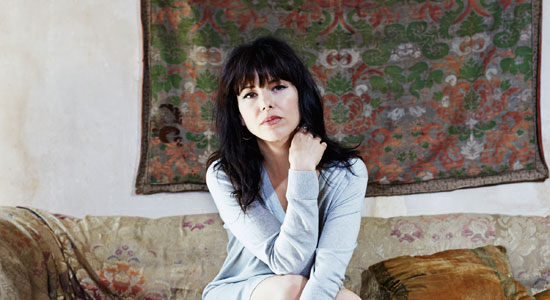
Following a divorce and the resulting depression, Imelda May hit the reset button with Life, Love, Flesh, Blood
Imelda May swears she never intended for this to happen. But the imposing Celtic rockabilly throne she’s effortlessly occupied since her hiccupy No Turning Back debut in 2003 now sits dusty and vacant. Incidents beyond her control forced her to abdicate three years ago and segue into the muted, Laurel Canyon-lissome beauty of her new T Bone Burnett-produced metamorphosis, Life, Love, Flesh, Blood.
“I just wanted to start from scratch, with absolutely everything, because everything I thought I knew about myself, I didn’t,” declares the diva, who was lovingly proclaimed by Bono “The other queen of Ireland” when she made a surprise appearance at U2’s 2015 homecoming concert in Dublin.
Gone are the ’50s-retro fashions and signature cinnamon-bun hairdo, replaced by eyebrow-length bangs and a casual look reminiscent of early Françoise Hardy. And May is no longer steamrolling through rockabilly stompers like a young Wanda Jackson—she delivers a Patsy Cline-classy performance on carefully considered ballads like “Human,” “Call Me,” “Black Tears” (featuring ethereal filigrees from her longtime chum Jeff Beck), “Sixth Sense” and a gospel-fervent “When It’s My Time” (with Jools Holland on subtly skeletal piano). Only on slinky R&B hip-shaker “Bad Habit”—about trying to avoid superfluous expenses and stick to a tight budget—does the singer even approach her old groove, albeit in a decidedly more subdued, reserved manner. Burnett maintains a haunted, catacomb-echoed mix throughout. When they first started work on the record, May says, “He told me, ‘I know who you are. I’ve watched you. And you weren’t ready for me before, but now you are.’ And I completely agreed.”
What force majeure changes shook May’s world so thoroughly? For one, the gradual dissolution of her marriage to guitarist Darrel Higham, from whom she officially split in July 2015. The paperwork on the couple’s divorce is nearly final. As she tells it, the breakup had been coming for a while. The pair wrote, toured and recorded together, and they were always of one mind when focusing on her Sun Session-y sound. “We had such a common interest in work, and we loved to chat about it,” she says. “But when work stopped, and you go home, and then there’s nothing left to talk about? That can be quite difficult. So I think we just grew apart, and it wasn’t easy to admit that.”
May and her ex have a daughter, Violet, now four, and she figured heavily into the separation. “Just having her makes you see that she deserves more, she deserves a lot of joy and happiness, and both of us decided that to be apart would be better for her,” she says, candidly.
May is nothing if not candid. Admittedly, she went through a dark, depressing period just trying to figure things out on her own. Monthly finances became a concern (hence “Bad Habit,” wherein she waives purchasing a pair of pricey Louboutin heels for paying the mortgage), as did finding her truer, more mature inner voice. Was she still rockabilly’s reigning highness? She didn’t know.
“So you put your daughter to bed, make sure she’s happy, and that’s when it was so hard—at night,” she says. “Because then you bawl your eyes out and try to focus yourself on writing an album.”
In the past three years, May elaborates, she endured heartache from Higham, got over it, began dating again, fell in love with a new beau, felt guilty for experiencing lust and passion again, and was jilted a second time, leading to more acute heartbreak. As a songwriter exploring new sonic territory, she had a lot to consider; “Black Tears” was the first mascara-streaked track she composed, and the waiting-for-that-phone-to-ring “Call Me” concluded the painful process. The songs weren’t her usual jubilant stock in trade, but her manager was floored by their brutal honesty. When she suggested—almost jokingly—that Burnett should produce them, her rep made it happen.
“So I’ve had massive changes,” she says and insists that her divorce has been so amicable that she even sang all the backing vocals on Higham’s upcoming solo album. “I wanted to change my hair, too, so—like a lot of people do—you just go to your hairdresser and say, ‘Cut it all off!’ Certainly a lot of women can relate to that, you know? I just wanted to get back to feeling like myself again, because I didn’t know who I was for a while.”
—Tom Lanham







